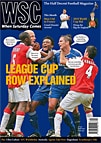 Soheb Panja reports on the evolution of sponsorship
Soheb Panja reports on the evolution of sponsorship
At the time of its announcement, Vodafone’s termination of a £9 million-a-year sponsorship deal with Manchester United was viewed as a symbolic moment in the club’s fortunes. In hindsight, it wasn’t the moment the United empire crumbled, rather a turning point for sponsorship in football and sport generally, one reflected in Emirates’ deal with Arsenal and that may see Liverpool’s new home also named after a company rather than a place.
Though there were other benefits, the most obvious sign of Vodafone’s deal with United was its name emblazoned on their shirts. When the mobile-phone company took away its sponsorship, it splashed out £66m on the Champions League. The rationale was that this offered Vodafone the chance to take greater “ownership of an event”. It could then arrange its own Champions League-related promotions exclusively for Vodafone customers, including live coverage of matches. A rival, O2, ended a £10m-over-four-seasons deal with Arsenal a few months earlier. It has taken on the former Millennium Dome, rebranding it “The O2”, with plans to offer its customers the chance to jump the queue for buying concert tickets, access to VIP areas and exclusive live music clips. Paul Samuels, head of sponsorship at O2, says: “The value from sticking your name on a football shirt doesn’t really justify the outlay for the big mobile brands any more.”
Two of the big deals last summer involved unknown companies getting their names on the shirts of Spurs and Manchester United. The latter’s £56m four-year tie-up with AIG made the insurance company a household name all over the world in the space of a few months. But this deal is seen as an exception to the general trend. Traditional shirt sponsorships have been found to turn off as many fans as they attract – another reason Vodafone turned to the Champions League.
O2 has offered glimpses of what we can expect to see in football with its “free pint and pie” sponsorship of the England rugby team. Like Vodafone, one of O2’s top priorities is stopping customers switching to another mobile company – a cup of lager and a Cornish pasty is a small price to pay.
The modern sponsorship deals are a million miles from the first “ownership deals”, such as BT Cellnet’s tie-up with Middlesbrough when the Riverside opened in the mid-1990s. Samuels, who was involved in that deal, remarks on the difference: “This was before discussions on how to retain customers and encourage them to use more services. It went along the lines of, ‘OK, for a certain amount of extra cash, we’ll bung in the stadium as well’.”
Arsenal’s Emirates Stadium is possibly the most extreme example of the new world of “brand ownership”. For an annual outlay of £8m per year, the Dubai-based airline wants to offer – among other things – a matchday draw to win free flights, match tickets to its passengers and Nigel Winterburn entertaining guests in executive boxes with anecdotes from the George Graham era.
Despite the benefits of the move – more seats and comfort, more income (especially from hospitality) for the club – there’s a feeling among fans that such close ties with a sponsor may yet damage the club’s identity, fears acknowledged by the man from O2. “You know you have succeeded in taking total ownership,” says Samuels, “when you hear Arsène Wenger talk about the Emirates Stadium on Match of the Day.”
Clubs such as Villa and Spurs, who hope to bridge the gap to the Champions League set, will have to offer ever greater concessions to commercial partners. The brand-ownership principle may soon involve giving the sponsor’s customers access to tickets before general release and a section of the ground exclusively for their use; the sponsor might even influence the signing of new players.
Paradoxically, sponsors are drawn to clubs with a long history and a distinct identity, despite the fact that the more “progressive” sponsorship schemes are eroding the elements that make the clubs so attractive. That Barcelona are owned by their fans and fiercely protective of their independent heritage are factors that now make them the most appealing club in the world for a potential sponsor.
From WSC 242 April 2007. What was happening this month